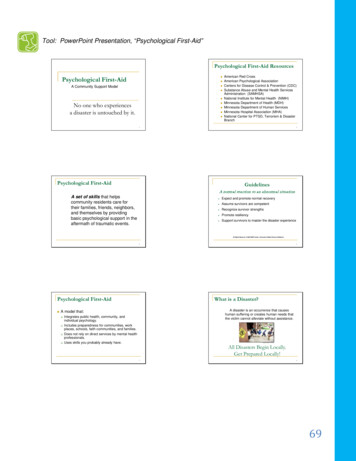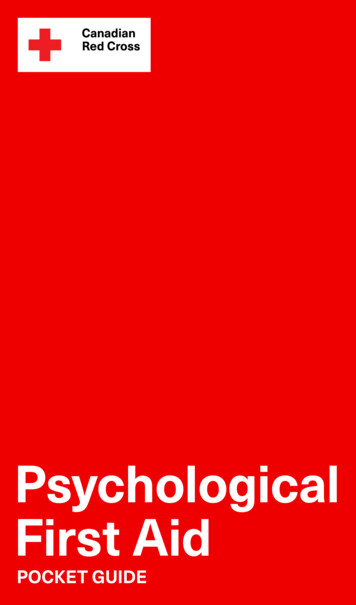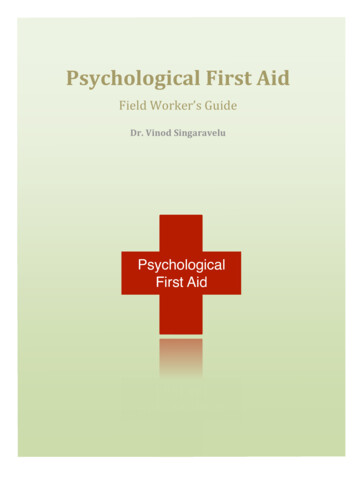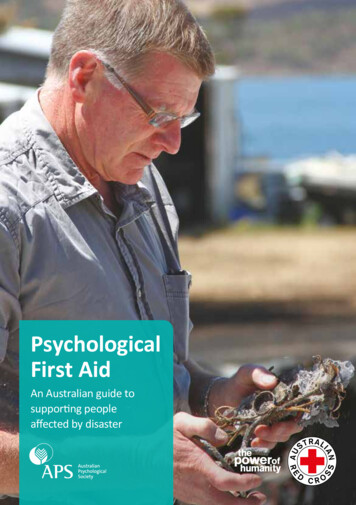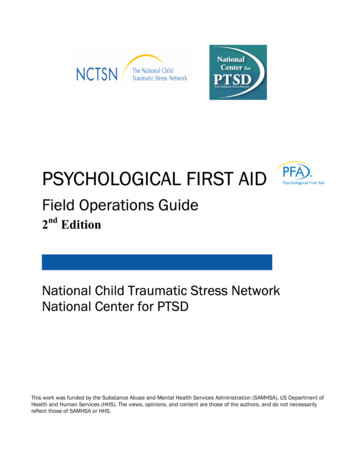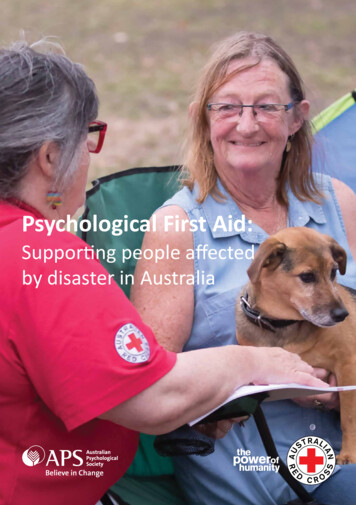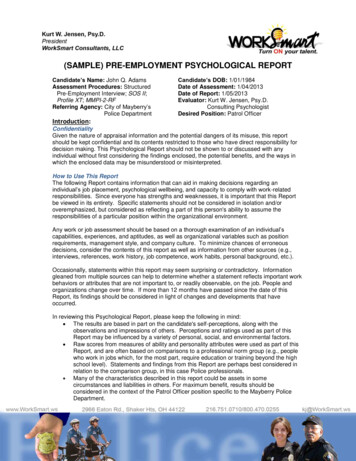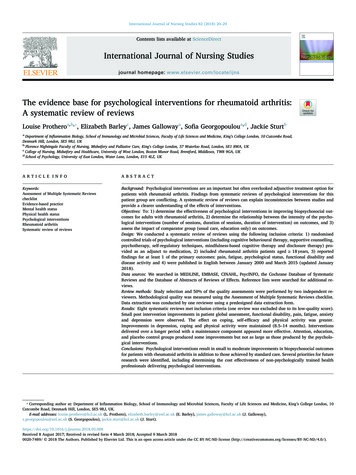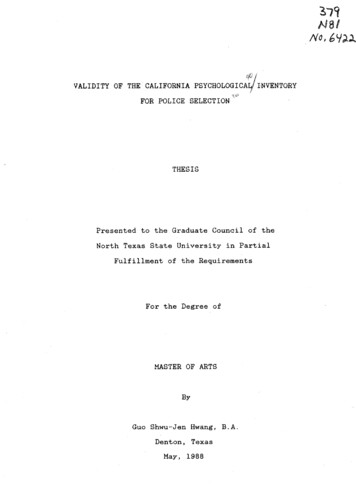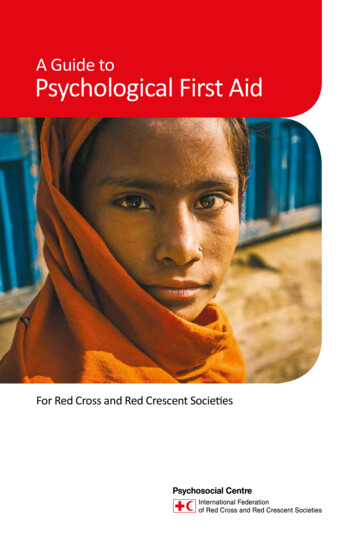
Transcription
A Guide toPsychological First AidFor Red Cross and Red Crescent Societies
A Guide toPsychological First AidFor Red Cross and Red Crescent Societies
A Guide to Psychological First Aid for Red Cross and Red Crescent SocietiesInternational Federation of Red Cross and Red Crescent SocietiesReference Centre for Psychosocial SupportBlegdamsvej 27DK-2100 CopenhagenDenmarkPhone: 45 35 25 92 00E-mail: psychosocial.centre@ifrc.orgWeb: www.pscentre.orgFacebook: www.facebook.com/Psychosocial.CenterTwitter: @IFRC PS CentrePsychological First Aid for Red Cross and Red Crescent Societies was developed bythe IFRC Reference Centre for Psychosocial Support.It comprises: A Guide to Psychological First Aid for Red Cross and Red Crescent Societies A Short Introduction to Psychological First Aid for Red Cross and Red Crescent Societies Training in Psychological First Aid for Red Cross and Red Crescent Societies:· Module 1. An introduction to PFA (4 to 5 hours)· Module 2. Basic PFA (8 to 9 hours)· Module 3. PFA for Children (8 to 9 hours)· Module 4: PFA in Groups – Support to teams (21 hours – three days)Editors-in-chief: Louise Vinther-Larsen and Nana WiedemannAuthor: Pernille HansenAdditional support: Wendy Ager, Louise Juul Hansen, Mette MunkReviewers: Wendy Ager, Ea Suzanne Akasha, Cecilie Alessandri, Eliza Cheung, Ziga Friberg, Ferdinand Garoff, LouiseJuul Hansen, Sarah Harrison, Sara Hedrenius, Elfa Dögg S. Leifsdóttir, Maureen Mooney, Stephen Regel, Gurvinder Singh.We are grateful to the Hong Kong Red Cross Branch of the Red Cross Society of China for their generous support inorganizing the pilot trainings and for their input and feedback on the trainings and on the written materials. We wouldalso like to thank the participants of the pilot training of Module 4: PFA in Groups – Support to teams in Copenhagen,October 2018.We would like to thank Icelandic Red Cross and DANIDA for their funding and support in developing these materials.Production: Pernille HansenDesign: Michael Mossefin/Paramedia/12007Front page photo: Yoshi ShimizuPrint: KLS PurePrint, Hvidovre, DenmarkISBN: 978-87-92490-53-7 (print), 978-87-92490-53-7 (online)Suggested citation: A Guide to Psychological First Aid for Red Cross and Red Crescent Societies, IFRC Reference Centrefor Psychosocial Support, Copenhagen, 2018.Please contact the IFRC Reference Centre for Psychosocial Support if you wish to translate, or adapt any part of Psychological First Aid for the Red Cross Red Crescent Societies. We welcome your comments, suggestions and feedback at:psychosocial.centre@ifrc.orgThe IFRC Reference Centre for Psychosocial Support is hosted and supported by Danish Red Cross International Federation of Red Cross and Red Crescent Societies Reference Centre for Psychosocial Support 2018
ForewordAnyone can find themselves in a situation in which they encounter a person in distresswho needs their emotional and practical support – psychological first aid (PFA). Criseshappen all the time. Sometimes they are small and personal in nature, affecting only oneperson. At other times, they are larger and adversely affect huge numbers of people.No matter the scale, people caught up in a crisis may need psychological first aid. As RedCross and Red Crescent staff and volunteers and humanitarian workers, the nature of ourwork dictates that we are likely to meet people in distress on an everyday basis.Psychological first aid is a simple, yet powerful way of helping someone in distress. It is aform of helping that involves paying attention to the person’s reactions, active listeningand if relevant, practical assistance to help address immediate problems and basic needs.Learning PFA skills and understanding reactions to crises empowers the helper not onlyto help others, but also to apply the same skills to their own crises.Although a vast amount of training and reference material on PFA already exists, therewas a specific need to develop materials adapted to the requirements and specific contextsof Red Cross and Red Crescent staff and volunteers, who work in their own communitiesin both emergency and non-emergency, or long-term settings.The materials developed include this guide to PFA for Red Cross and Red CrescentSocieties, a small introductory booklet and four training modules. The first two trainingmodules cover basic PFA skills, the third is on PFA for children and the fourth onproviding PFA in groups. The fourth training module responds to a need for more trainingand guidance on how to provide care and support to Red Cross and Red Crescent staff andvolunteers.We very much hope that the range of materials provided in Psychological First Aid for RedCross and Red Crescent Societies will support staff and volunteers in their primary work ofhelping beneficiaries. Our goal in this endeavour is as always to assist National Societiesin offering the most effective psychosocial support possible to the people they serve.Nana WiedemannHead of IFRC Reference Centre for Psychosocial Support
CONTENTSIntroduction.10What is PFA?. 13Why do we provide PFA? . 15Crises and reactions.16Different kinds of crises. 17Reactions to crises. 21Providing psychological first aid.26Who can provide PFA?. 27Who needs PFA?. 27Where can you provide PFA? . 27When do you provide PFA? . 28Preparing to provide PFA. 28Look, Listen and Link. 29Look. 30Listen. 32Link . 37Making referrals. 40Complex reactions and situations.43Complex reactions. 44Complex situations. 49Children.51Children’s understanding of and reactions to crises. 53Activities to support children. 56Helping children in distress – PFA for children. 58Children’s complex reactions and situations. 62Helping parents and caregivers to support their children. 64
PFA in groups – support to teams.65Look, Listen and Link for PFA in groups. 67When is PFA in groups needed?. 68Why provide PFA in groups?. 68Preparing for a PFA and support meeting. 68What happens in a PFA and support meeting?. 70Challenges in group settings. 76Supervision and self-care. 78PFA helpers.79Characteristics of PFA helpers. 80Helping in different roles. 80Red Cross and Red Crescent staff and volunteers. 80Do no harm.84Cultural contexts. 85Safety, dignity and rights. 86Confidentiality. 86Dos and Don’ts. 88Self-care: Look, Listen, Link.89Recognize your own limits and limitations. 90Recognize signs and symptoms of stress and burnout. 91Applying Look, Listen and Link to self-care. 92Supervision and peer support. 96Monitoring and evaluation of PFA .97What is M&E?. 98PFA and M&E. 99Challenges in M&E. 103
ContentsIntroduction10Crises and reactions16Providing psychological first aid26Look, Listen and Link29Complex reactions and situations43Children51PFA in groups – support to teams65PFA helpers79Do no harm84Self-care: Look, Listen, Link89Monitoring and evaluation of PFA97
/FINNISHREDREDCROSSCROSS
INTRODUCTIONIntroductionPsychological First Aid for Red Cross and Red Crescent Societies has been developed forthe staff and volunteers of Red Cross and Red Crescent Societies and other organizationsworking in situations where psychological first aid (PFA) may be relevant. Psychologicalfirst aid is a direct response and set of actions to help someone in distress. It is an approach to helping which is particularly well-suited for the International Federation of RedCross and Red Crescent Societies, as it is based on the fundamental principle of humanityand the intention to help prevent and alleviate human suffering.PFA for Red Cross and Red Crescent Societies has several parts that can be used separatelyor together. It comprises this guide, a small booklet on PFA, and four training modules onPFA. This guide has general information about psychological first aid. It can be used on itsown for psycho-education and as a reference for the training modules that accompany it.The training modules include instructions, notes, and training resources for the facilitators.An overview of the training modules is presented in the table below.T R A I N I N G M O D U L ES1: Introductionto PFA2: Basic PFA3: PFA for Children 4: PFA in Groups– Support to teamsHow long4-5 hoursdoes it take?8.5 hours8.5 hours21 hours(three days)Who is thetraining for?All Red Cross andRed CrescentMovement staffand volunteersStaff and volunteers with someprior knowledgeand experience ofproviding psychosocial supportStaff and volunteerswhose workinvolves interactionwith children andtheir caregiversManagers orothers whoprovide care andsupport to staffand volunteersWhat is itabout?It introduces participants to basicpsychological firstaid skillsIt introduces basicpsychological firstaid skills and presents a range ofsituations facedby adults, theirreactions to crises,and how helpersmay respondappropriatelyIt focuses on children’s reactions tostress, and communicating withchildren and theirparents andcaregiversIt is on providingpsychological firstaid to groups ofpeople who haveexperienced adistressing eventtogether such asteams of Red Crossand Red Crescentstaff andvolunteersEach training module is independent of each other, except Module 4: PFA in Groups– Support to teams training which requires prior participation in Module 2: Basic PFAModule 4 has been developed specifically with Red Cross and Red Crescent staff andvolunteers in mind. However it can be adapted and used for other groups of peopleaffected by similar situations. PFA can be provided to groups as a form of psychoeducation to raise awareness of signs of distress. Such groups also give facilitators anopportunity to identify anyone needing individual referral or other support. PFA ingroups are therefore both preventive and responsive forms of support.A GUIDE TO PSYCHOLOGICAL FIRST AID 11
INTRODUCTIONAll of the training modules use case studies. These can be adapted to make them moreappropriate to the training participants and context.PFA in Red Cross and Red Crescent SocietiesPsychological first aid is a psychosocial support activity. Psychosocial support refers tothe actions that address both the emotional and social needs of individuals, with the aimof helping people to use their resources and enhance resilience. The model below showsexamples of different kinds of mental health and psychosocial support activities. Psychological first aid can be a stand-alone intervention in a crisis situation or a component in apsychosocial support programme that includes other activities. It can also be a componentof other interventions, for example in child-friendly spaces or as part of caring forvolunteers.Although PFA is a psychosocial support activity, the use of PFA skills and knowledge is notrestricted to psychosocial responses or programmes. All Red Cross and Red Crescent staffand volunteers can use their PFA skills and knowledge in other aspects of their work andin their personal lives.Mental health and psychosocial upsPFASupport tostaff emsFamilyCommunityFigure 1: Umbrella shows different types of mental health and psychosocial support services that can be given to individuals,families, and communities.12A GUIDE TO PSYCHOLOGICAL FIRST AID
INTRODUCTIONWhat is PFA?Psychological first aid is a method of helping people in distress so they feel calm andsupported in coping with their challenges. It is a way of assisting someone to managetheir situation and make informed decisions. The basis of psychological first aid is caringabout the person in distress. It involves paying attention to the person’s reactions, activelistening and, if needed, providing practical assistance, such as problem solving or help toaccess basic needs.PFA approachA number of different models of psychological first aid have been developed over theyears. They are all slightly different, but follow the same principles of helping people indistress by ensuring their safety, promoting calm, comforting them, talking with them,helping them to access who or what they need. In these materials, various aspects of thesedifferent approaches have been integrated, using the same three action principles as theWHO model: ‘Look, Listen and Link’ . The approach presented here is adapted to suit themany varied activities and situations that Red Cross and Red Crescent staff and volunteersparticipate in worldwide.Read more on the Look, Listen and Link approach in the book byWHO (2011) Psychological First Aid: Guide for field workers.All people experience stressful situations and events in their lives, such as a heatedargument with someone, a conflict at work, getting stuck in traffic or running late for animportant job interview. Most people learn how to deal with the regular challenges theyface. However, some experiences and situations are out of the ordinary and more difficultto deal with. Examples are personal assault, when someone discovers they have a terminalillness, a car accident, losing a loved one or home and belongings, extreme violence or fearfor their life and safety. Experiences like these can be the results of small or large-scale crises in the family, the local community, natural disasters or on-going situations of armedconflict.DAMIEN SCHUMANN/IFRCIt is a natural reaction to want to helpsomeone in distress. Psychological firstaid aims at reducing someone’s experience of distress whilst also focusing onpractical needs. It is a method of helpingthat often involves linking people withassistance from others. Psychological firstaid skills involve knowing how to assessa situation; familiarity with commonpatterns of reactions to crises; how toapproach someone in distress and how tocalm them if needed; and how to provideemotional support and practical help.A GUIDE TO PSYCHOLOGICAL FIRST AID 13
INTRODUCTIONLOOKfor information on what has happened and is happening who needs help safety and security risks physical injuries immediate basic and practical needs emotional reactions.LISTENrefers to how the helper approaches someone introduces oneself pays attention and listens actively accepts others’ feelings calms the person in distress asks about needs and concerns helps the person(s) in distress find solutions to their immediate needsand problems.LINKis helping people access information connect with loved ones and social support tackle practical problems access services and other help.Psychological first aid makes the person in distress feel they have been seen and heard andthat they have support. Perception of support is a key element in empowering someone tobe able to manage their situation and challenges. Understanding reactions to crises andknowing how to help others alleviate and reduce experiences of distress also empowershelpers, so they can apply these skills to their own crises.Hobfoll’s principles of psychosocial support in emergencies*There is widespread consensus and support for the five intervention principles in psychosocial support in emergencies proposed by Hobfoll et al. (2007): ensuring safetypromoting calmpromoting self- and collective efficacypromoting connectednesspromoting hope.*) Hobfoll S. E, Watson P, Bell C. C, Bryant R. A, Brymer M. J, Friedman M. J, et al. Five essential elements of immediateand mid-term mass trauma intervention: Empirical evidence. Psychiatry. 2007;70:283–315.14A GUIDE TO PSYCHOLOGICAL FIRST AID
INTRODUCTIONThese principles have been integrated into the approach described in these materials.It is important for the helper to keep these principles in mind when providing PFA.Why do we provide PFA?The fundamental reason for providing psychological first aid is to help someone in distress.Psychological first aid can help people feel calm, safe and secure. It is humane, caring andcompassionate support that relates to both emotional and practical needs and concerns.Psychological first aid is help based on the understanding that there are times when peoplehave experiences that feel overwhelming and this can interfere with their usual abilityto cope. Through active listening and talking calmly to the person in distress, the helperworks to identify what the person needs to manage his or her situation. For example, thiscould be by helping them organize their ideas and feelings so they can better prioritizewhat is needed and feel less overwhelmed. These needs may be practical, such as warmclothes, food or water, or somewhere to sit down calmly. They may also be emotional, suchas needing to cry or talk about what has happened, and to feel heard and understood.Other ways of helping are linking the person with loved ones or helping them accessinformation and services to address their needs. An important aim of psychological firstaid is to make the person feel they are supported and connected to help. This will makethem feel stronger and able to manage their challenges and be able to care for themselves.PFA is comforting someone in distress and helping them feel safe and calm assessing needs and concerns protecting people from further harm providing emotional support helping to address immediate basic needs, such as food and water,a blanket or a temporary place to stay helping people access information, services and social supports.PFA is not something only professionals do professional counselling or therapy encouraging a detailed discussion of the event that has caused the distress asking someone to analyze what has happened to them pressing someone for details on what happened pressuring people to share their feelings and reactions to an event.See more on examples of different psychosocial interventions thatinclude psychological first aid in Strengthening resilience: A globalselection of psychosocial interventions found in the IFRC PS Centre’slibrary online: www.pscentre.orgA GUIDE TO PSYCHOLOGICAL FIRST AID 15
CRISES AND REACTIONSCrises and reactionsCARL WHETHAM / IFRC
CRISES AND REACTIONSCrisis and reactionsDifferent kinds of crisesThere are many different situations where psychological first aid can help people sufferingor in distress. The examples given in this section are related to some of the activities theRed Cross and Red Crescent National Societies work with around the world.Personal crisesPsychological first aid skills can be applied in personal situations. Most people encountersituations in their lives where family members or friends experience crises, for example ifsomeone loses their job, is in a car accident or someone they love dies. Personal crises canlead to a variety of feelings depending on what has happened. Common reactions to theexamples given are shock, confusion, fear, sadness or anger which can interfere with theperson’s ability to manage the situation. Psychological first aid helps the person in distressfeel calm and supported, and able to identify what practical steps they need to take tohandle the situation positively. Knowing psychological first aid can also assist the helpersrecognize their own reactions to stressful situations and promote self-care.Social challengesStaff and volunteers support many individuals and groups of people who are marginalisedand experience social isolation. Examples are women and children suffering domesticviolence, socially excluded families, homeless people, older people, or people who live ininstitutions such as care homes for older people, psychiatric hospitals or prisons. Socialexclusion and loneliness can lead to feelings of not belonging and a sense of worthlessnessand loss of self-efficacy. As a result, an individual may lose hope and the will to live or mayhave an emotional breakdown or begin self-harming behaviour. Psychological first aid canhelp socially excluded and lonely persons by firstly making them feel cared for, understoodand connected to their helper, and by linking them to other people or services that canhelp address their emotional, social, and practical needs.Health challengesDAVID CHANCELLOR/IFRCNational Societies in mostcountries around the world areinvolved in health-relatedactivities, ranging from training and providing physicalfirst aid, to supporting peopleliving with physical and mental disabilities, HIV and AIDS,cancer, neurological illnesses,Alzheimer’s disease anddementia. They also respondto epidemics such as Ebola,cholera and Zika. Psychologicalfirst aid can help those who areill as well as their loved onesA GUIDE TO PSYCHOLOGICAL FIRST AID 17
CRISES AND REACTIONSCASEwho also experience distress dueto the illness and accompanyinglife changes. Psychological first aidBen works as a counsellor at a communitycan help not only at the time of aRed Cross health clinic. He uses PFA skillsdaily in his work when he has to break thediagnosis, but also during an illness,news to clients about a positive HIV test. Benfor example when the person whois trained to respond in a caring and supportis ill feels distressed. It can alsoive way to their initial reactions of shock. Hehelp the family deal with issues ofhelps clients reduce their fear of the futurefrustration and sadness over notby calmly providing them with informationbeing able to take the illness away.on what the next steps are to manage theirThere may be issues related to fearshealth challenges. He gives them pamphletsabout how to cope with insecuritieswith referral information and makes a pointabout the future, for example, relatedof asking all his clients if they would like helpto financial worries. Illness in thefrom him to share their status with a trustfamily can also lead to social exclued family member or friend. If they do, hesion and loneliness, which can alsomakes the appointment before they leavethe counselling room.be addressed through PFA. PFA canhelp family members deal with thegrieving process when losing a lovedone, both at the time of the death and at difficult times afterwards, such as anniversaries.PFA in health workNatural disastersDisasters such as earthquakes, floods and fires typically affect many people at the sametime and often involve large-scale devastation and loss of homes and lives. Naturaldisasters are frightening and often result in chaos and panic. People affected by naturaldisasters risk being physically hurt, witnessing the injury or even death of others, fearingfor their own lives and safety, being separated from their families and loved ones andtemporary or permanent relocation. All of these experiences can be difficult to deal withboth in the moment and after the events.Psychological first aid has been shown to be effective in helping to prevent long-termnegative consequences of traumatic experiences such as natural disasters, by helpingaffected persons feel calm, supported and connected so they can cope better and accessthe help they need to manage the crisis. Red Cross and Red Crescent staff and volunteersoften help in their own communities after disasters, and psychological first aid skills andknowledge are helpful not only in their work to help others, but also in terms of managingtheir own family and personal crises.Man-made disastersThere are many varying disasters that are the result of human behaviour, such as fires,explosions in factories or mines, massive accidents involving transport vehicles or panicsituations at festivals when stages collapse, etc. Like natural disasters, man-made disastersare frightening and can quickly lead to panic and chaos. They can be as devastating interms of losses as natural disasters, with the main difference being that the disaster wasrelated to man-made things or human behaviour, which may negatively impact affectedpersons’ trust in others.18A GUIDE TO PSYCHOLOGICAL FIRST AID
CRISES AND REACTIONSViolenceMany people witness or experience violence, such as in domestic conflicts, sexual andgender-based violence, criminal violence, gang-related violence, hate-crimes and stigmabased violence. Stigma-based violence is violence against a person or group of peoplebecause of stereotyping and judging a person based on their characteristics, associations,religion, ethnicity, etc. Belonging to a specific gender, age, ethnic group, living with adisability, being of a diverse sexual orientation or being an immigrant are examples offactors that can heighten someone’s risk of experiencing violence.CASEViolent experiences are frightening and usually lead to strong physical and emotionalreactions. How people react to experiences of violence depends on several factors, suchas how severe the violent act was and what the consequences were, the context of theviolence, who the perpetrator was, how others reacted, what help was given, etc.Receiving psychological first aid can be an invaluable support, helping the affectedperson to become calm and be able to make decisions on how to stay safe in the future.PFA in armed conflictWhen the soldiers came to Leila’s village, she managed to gr
Psychological First Aid for Red Cross and Red Crescent Societies has been developed for the staff and volunteers of Red Cross and Red Crescent Societies and other organizations working in situations where psychological first aid (PFA) may be relevant. Psychological first aid is a direct
